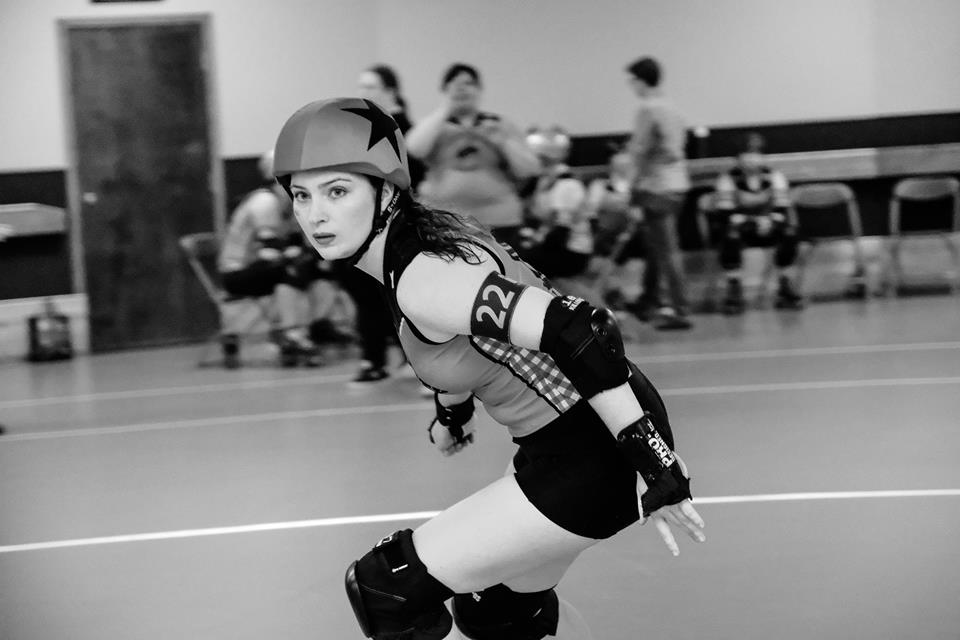So you want to be a better jammer. Here are a few things I’ve picked up along the way that are so easy you can implement them at your next scrimmage:
Use your lap time to take a breath … unless there’s no time
A lot of newer skaters think that as a jammer you must fight through the pack, then sprint to do it all over again. And I really like that assumption. For the most part, that’s exactly what jammer should do.
But there’s something to be said about taking a breath. If you’ve fought and fought and fought through a pack and you’re finally out of the engagement zone (without fear that someone will come pull you back), if you need to take the extra [literal] 2 seconds it will take for you to catch your breath, reset and be a strong, penalty-free jammer when you have to fight through that pack again: Do it.
Don’t be lazy. This isn’t an excuse to lallygag, it’s a strategy. If those couple of deep breaths are going to keep you clean and better prepare you for the 2-minute fight, take it.
Sometimes the game clock says you have 8 seconds and it’s a tied game. This tip is not for that moment. It’s for almost every other moment you’re jamming.
Aim for the weakest … or strongest
Maybe it’s obvious to aim for the weakest blocker on the opposing team. She’ll fall out of her wall, you’ll slip through and there will be points and glory and confetti. So do that.
… unless …
Unless you’re a bulldozer of a skater. One of those super strong women who frequently gets back-block calls off the line even though you feel you’ve hit cleanly (but with force). If you’re that skater, try aiming for the gap by their strongest blocker(s) because they’re less likely to fall when you hit them legally, but with force.
Look at their feet
At the jam start, whose feet are in a plow stop, whose feet are in a hockey stop and whose feet are pointing straight ahead? Aim for the people whose feet are pointed straight ahead, whose wheels are ready to roll right out of play.
Be patient with yourself / figure them out
Ever go into your first jam of a bout, get denied lead and think, “this might not be my day.”? If so, this is for you. You got to let that shit go. Give yourself two jams to figure out the other team — and *use* them. Really think, “ok, when I hit X that didn’t work, maybe I need to try my line work.” Address whatever issues came up and try a few approaches early so you can quickly figure out their weaknesses and exploit them all game long. I will accept “losing” the first two jams if it means winning the next 38. Be patient with yourself.
The mental game of struggle v failure
Struggle is a big part of jamming at all levels. We’ve seen Champs games that have 2-minute-no-lead jams. It’s not because those jammers suck. Struggle is part of the job of jamming. In the moments you feel struggle, know it’s *not* failure. When you’re pushing a wall of strong blockers and they’re not moving much, that’s not you failing — it’s you trying and learning and working. This is the work of a jammer. It’s normal. If you can embrace it, you’ll be happier and go farther.
If you’re going to pass, do it kindly and clearly
Desperate times call for desperate star passes … wait, no …
It’s often the exhausted jammer who will get the Star Pass Violation penalty … or just be flat-out not-so-nice to their pivot by offering a poorly positioned pass. Don’t be that person.
If you’d like to execute a pass:
- Alert your pivot
- Make sure your pivot has a chance to get to the front of the pack
- Be upright and in bounds
- Only pass if your pivot is upright and in bounds
- If complete, be helpful, either as offense of as a blocker. Your team still needs you.
And on a not-so-PC note: Think about your pivot. If you’re unable to make it through this pack, is s/he the type of skater who could make it through? Hopefully yes. But if it’s a “no” it might be less damage to your team’s score for you to suffer through the two minutes. It also means you should talk to your bench coach when you get back and ask for a pivot whose skill set is different than your own, so that if your skills aren’t working on a wall, maybe hers will.
Practice stupid shit
Play at practice. Play at warmups. Even on your own. Play with your one-footed turns, your 360s, play with your backward duck walks, dance on your toe stops, skate without toe stops — anything that’s challenging, weird and fun. Do it. Even if it seems useless, it’s not. When we practice weird shit, we inherently get better at the normal shit, our balance gets better and we as competitive humans love to play … and love is important.

Other game changers:
- Cross train like a mother.
- Watch high-level footage. Having a visual of what “success” looks like is a proven way to reach proficiency. The more footage you watch, the better you will get.
- Work on your mental game (books, meditation, however you do you).
- Jam ref. You’ll learn so much more about how to be a great jammer and secret tips only refs know. Seriously.
Got tips? I could sure use em 😉 Drop em in the comments:





